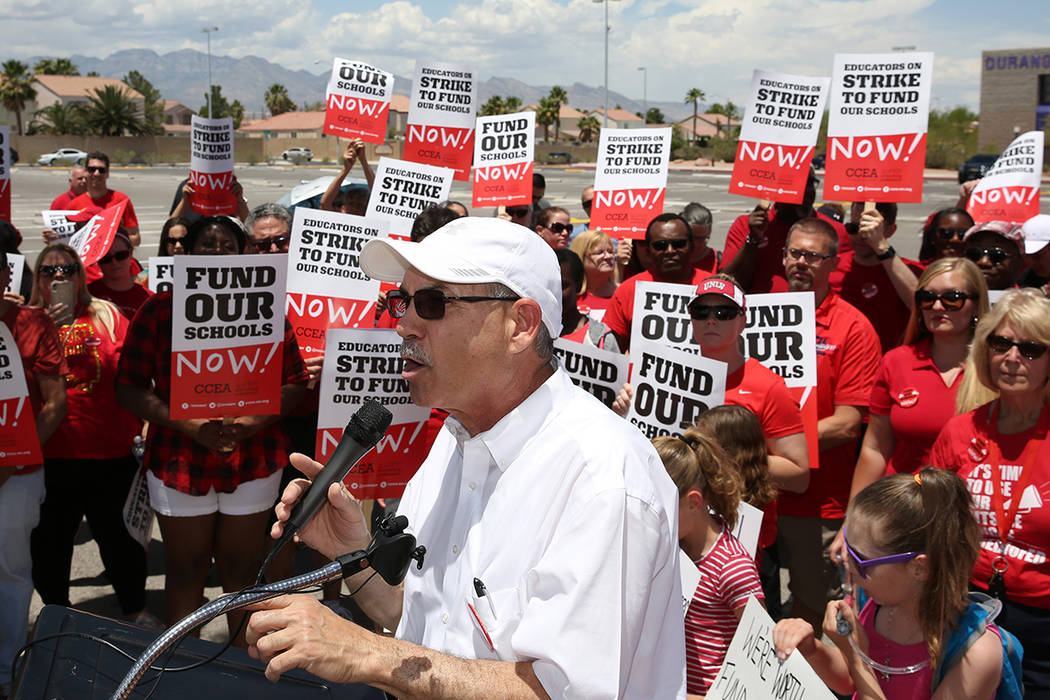STEVE SEBELIUS: The questions about school taxes
When it comes to raising money for education in Nevada, it’s a mixed bag.
In 1994, voters split their vote on a school construction bond, passing one part easily but narrowly defeating a second part.
In 2008, an advisory question called for raising hotel room taxes by up to 3 percent to pay for teacher salaries and student achievement. It passed easily, 66 percent to 34 percent. (The idea was approved by the Legislature, but the money was redirected during the recession.)
In 2012, a school construction bond failed in Clark County, 66 percent to 34 percent.
And of course, in 2014, a 2 percent margin tax on businesses proposed by the state teachers union went down to defeat, 79 percent to 21 percent after a well-funded campaign against it.
It’s against that backdrop that the Clark County Education Association — which represents local teachers — has announced its intent to circulate a pair of initiatives that will together raise $1 billion in new taxes to fund education. (Exactly which taxes will be raised and by how much is still under discussion.)
The union voted overwhelmingly recently to raise its dues by $9 each pay period to cover the costs of the $2.2 million effort to get the questions written, defend them in court and gather signatures.
If the initiatives survive the inevitable legal challenges and gather the required 97,598 valid signatures, they’ll go to the Legislature in 2021. Lawmakers will have a chance to pass them immediately or allow them to go to the ballot in 2022.
Regardless of the electoral history, it would be wise not to count the Clark County Education Association out. The union, led by the unconventional John Vellardita, recently won a standoff with the Clark County School District in which teachers threatened to strike over promised pay in exchange for additional education and training.
But the campaign against the measures is already brewing, and any veteran of past education battles can hear the arguments already.
First, didn’t we pass a marijuana tax for schools?
Yes, we did — and all that marijuana tax money is currently going to education, including a portion of pot taxes that had been temporarily diverted to the state’s rainy day fund.
Second, didn’t we just create a big new tax for education?
Yes, we did: The Republican-controlled 2015 Legislature passed Nevada’s first tax on business income, the commerce tax. That money is going toward schools, including to some specialized programs for low-income and English language learners.
Third, didn’t the Democrats devote tax money to schools, too?
Yes, they did. In addition to raising per-pupil spending, directing all marijuana taxes to education and authorizing local governments to raise sales taxes to pay for schools, lawmakers prevented the payroll tax from falling and sent that money to education, too. (Republicans are suing over that one, arguing Democrats failed to get the required two-thirds vote.)
The final question: With all those taxes going to education, why do schools need more?
The Legislature did approve a two-year, $2.3 billion education budget. Per pupil funding was set at $10,227 in the first year of the budget and $10,319 in the second, less than the national average estimated by Education Week magazine at $12,756, but still higher than some neighboring states.
The thorny question: What are we getting for our money? While high school graduation rates are increasing, and the number of schools earning good rankings in Clark County increased in the last year, some troubling signs remain. Nevada System of Higher Education Chancellor Thom Reilly said recently that about half of Clark County high school graduates still need remedial classes when they enroll at UNLV or UNR.
And, finally, the real question: What’s being done to ensure the entire education system is working to achieve real results for students, who should be, after all, at the center of every education debate?
Yes, money is part of the equation, a very big part, in fact. The Clark County Education Association may yet persuade Nevadans to raise taxes for schools. But it’s only part of the problem.
Schools don’t exist simply so teachers and administrations will have jobs. They exist to equip students with the knowledge and skills they will need to inherit the mantle of leadership for the nation.
What’s being done to make sure that all students are being given their best opportunity to succeed? To make sure that opportunity is equal for students of all races and languages — and for special education kids, too? What’s being done to ensure the public has a measure of accountability for the huge investment of tax dollars? And to offer a permanent fix to consistent problems?
The debate in the coming year will be about taxes, but the questions we should be asking go far beyond money. We need to address those questions, too, although it’s not as easy as circulating a petition or drafting a nifty campaign. But until we do, none of the other debates will matter.
Contact Steve Sebelius at SSebelius@reviewjournal.com or 702-383-0253. Follow @SteveSebelius on Twitter.























